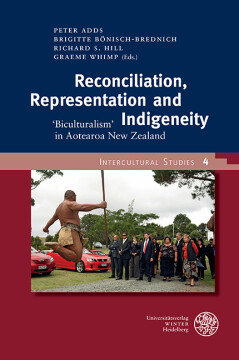
BUCH
Reconciliation, Representation and Indigeneity
‘Biculturalism’ in Aotearoa New Zealand
Herausgeber: Adds, Peter | Bönisch-Brednich, Brigitte | Hill, RIchard S. | Whimp, Graeme
Intercultural Studies, Bd. 4
2016
Zusätzliche Informationen
Bibliografische Daten
Abstract
Aotearoa New Zealand is frequently viewed as the most advanced country in the world when it comes to reconciliation processes between the state and its colonised Indigenous people. The fact that this book’s contributions are written by scholars who are all engaged in such processes is alone testament to this alone. But despite all that has been achieved, the processes need to be critically evaluated. This book offers an up-to-date analysis of the reconciliation processes between Māori and the Crown by leading and emerging scholars in the field. It is the first attempt to grasp the link between contemporary politics, the notion of activist research, and historical and anthropological analysis. The argument this collection is based on is that reconciliation processes are manifested in much more than government policies, legal decisions and law-making. Both research and political efforts fully involve Indigenous scholars, legal and historical academics, communities, tribes, engaged Pākehā (settlers and immigrants of European descent) and national institutions. Among other things, such negotiation processes are tangibly represented by (new) rituals, by open and media-streamed debates, and by public institutions such as the Waitangi Tribunal.
Inhaltsverzeichnis
| Zwischenüberschrift | Seite | Aktion | Preis |
|---|---|---|---|
| Cover | C | ||
| Title Page | 3 | ||
| Copyright | 4 | ||
| Contents | 5 | ||
| Brigitte BÖNISCH-BREDNICH, Graeme WHIMP, Being in Aotearoa New Zealand. Academic approaches to reconciliation, representation and Indigeneity | 7 | ||
| Peter ADDS, New Zealands Treaty of Waitangi reconciliation processes. A Māori Treaty educators perspective | 19 | ||
| Rawinia HIGGINS, Ki wīwī, ki wāwā: Normalising the Māori language | 25 | ||
| Carwyn JONES, Recognising Māori legal traditions in reconciliation. Issues of theory and research methodology | 39 | ||
| Marama MURU-LANNING, Intergenerational investments or selling ancestors? Māori perspectives of privatising New Zealand electricity- generating assets | 49 | ||
| Richard S. HILL, Settling historical Māori claims under the Treaty of Waitangi. An assessment of the first twenty-five years, 19892014 | 65 | ||
| Therese CROCKER, Reconciliation and resolution. The Office of Treaty Settlements and the Treaty of Waitangi claims process in Aotearoa New Zealand | 81 | ||
| Richard BOAST, Negotiations for reconciliation. How they can exacerbate division as well as promote reconciliation | 95 | ||
| Martin FISCHER, Waikato-Tainui and Ngāi Tahus Treaty-settlement negotiations with the Crown | 111 | ||
| Barry RIGBY, Forty years on. A personal view of the history of the Waitangi Tribunal, 1975-2015 | 129 | ||
| Alex FRAME, Paul MEREDITH, Mock fighting and performed reconciliation. Some examples from Māori and Tahitian custom | 137 | ||
| Tanja ROTHER, Mana whenua and the ownership of nature. Challenges to the co-governance of natural resources in Aotearoa New Zealand | 151 | ||
| Andrea BLÄTTER, Tanja SCHUBERT-McARTHUR, Pōwhiri for the ancestors. Representation of Indigeneity and reconciliation in a Māori ritual | 167 | ||
| Robert DIDHAM, Paul CALLISTER, Two peoples? Demographic changes from first contact to the 21st century | 183 | ||
| The Treaty of Waitangi. The following version of the Treaty is taken from the first schedule to the Treaty of Waitangi Act 1975 | 203 | ||
| Biographical notes | 207 | ||
| Glossary | 211 | ||
| Index | 215 | ||
| Back Cover | Back C |


 Publishing Platform by CloudPublish
Publishing Platform by CloudPublish